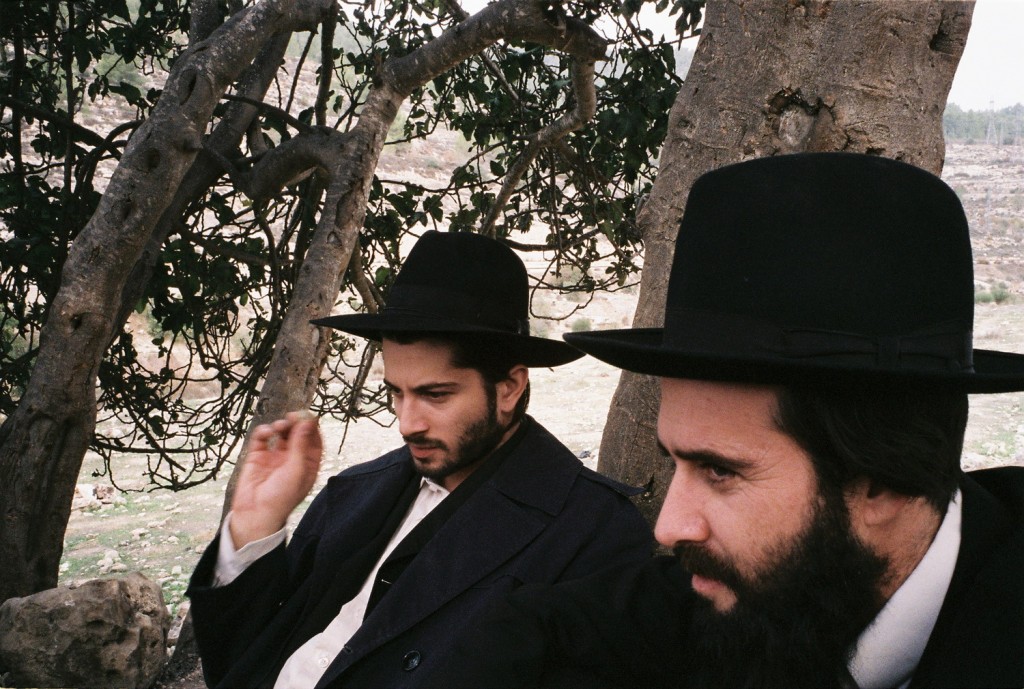The Wolgin Best Feature-Film competition kicked off on yesterday, with the screening of Haim Tabakman’s film Eyes Wide Open (Einayyim Pkuhot), which had its premiere at Cannes, and (I learned from the director) will be in competition at the Toronto film festival later this year. Written by Merav Doster (making this a relatively rare high-profile Israeli film, not to be written or co-written by its director), it deals with homosexuality in the Ultra-Orthodox community in Me’aa She’arim in Jerusalem. While perhaps not as incendiary as such a subject might have once been, it is certainly a tricky issue to handle. To Tabakman and Doster’s credit, it does not come off as a film that exists solely to court controversy. Unfortunately, it is not entirely successful as a story, either.
Zohar Strauss plays Aharon, a 30-ish Haredi man with a wife and three children, who takes over the family’s butcher-shop after the passing of his father. Heartthrob Ran Dankner plays Ezri, a young Haredi man who wanders into Aharon’s shop, seeming rather lost. Aharon gives Ezri a job as his assistant, and puts him up in the small room above the shop. Ezri obviously has a troubled past- there are rumblings that he was kicked out of a Yeshiva up north for being a sinner, and has come to Jerusalem in search of a married man with whom he had some sort of relationship. Aharon quickly picks up on Ezri’s homosexuality, and finds himself tempted by the young man. Initially, he struggles against temptation, saying that resisting the temptation is a way to get closer to god…but before long, he succumbs. As he spends more and more time with Ezri on top of the butcher shop, the world around him grows more and more hostile- Aharon finds himself threatened, covertly and openly, by financial ruin and banishment, as well as the loss of his wife and children.
The filmmakers are trying their best to show respect and understanding for these people and their community. It really wants to believe the spiritual conundrum, and tries to be understanding about the power of restraint. Alas, earnest as they might be, this is not their milieu. No matter how good some of the performances are (Strauss is fantastic, and Tzahi Grad is quite convincing and warm as Aharon’s rabbi), aside from a number of moments that rang true, this is unavoidably a film made by outsiders, who are not willing to accept something that is so contrary to their own secular beliefs. I do not want to suggest that this is simple liberal agit-prop- not at all. I believe that they had a great deal of goodwill towards the world they’re representing. But it is not nearly enough to make this film the powerful experience it seems they were aiming for. At the end of the day- no matter how much weight they gave the spiritual struggle (which provide some of the most affecting scenes in the film), I did not get the sense that they believed in the virtue of the restraint that Aharon tries to live by.
From a brief conversation I had with director Tabakman, I learned that aside from some guerrilla style shooting in the actual community they’re representing (shooting without the knowledge of the people around the actors), the majority of the film was shot in the neighborhoods and alleys (a lot of alleys) in Yaffo. I also asked Refael Katz, the producer of the film, about what amount of cooperation they had from the Haredi community, if any. Katz told me that they received a great deal of covert support doing the research, but that doing shooting, they were on their own. While a great deal of the performances and locations seem to have gained some credibility from the research process, the weakest part of this film is the characterization of Ezri, and the performance by Dankner. Whereas Aharon is relatively fleshed-out character, compelling and believable, Ezri comes off as a one-dimensional trouble-maker. There’s nothing spiritual about him- nothing even that specific about him at all. He’s an abstraction- a single-minded venal creation, careless about the people he hurts; who seemingly enjoys the chaos that his presence creates. This is a rather ugly portrayal of a Haredi homosexual, particularly because he doesn’t seem all that devoted to his religious persona. Compared to Strauss, he comes off a sexual-predator, who’s wearing this costume as way of getting at new victims. I’m sorry to say it, but this struck me as a character seen with sympathy by the filmmakers, whereas I thought he came off as a blunt and rather disgusting person.
That being said…I think the film does hold some modest interest in the two struggles present- Aharon’s struggle between desire and religion, and the filmmakers struggle between their secular preconceptions and the sympathy they had for elements of this life-style, alien to them. Although I could have done with fewer extended shots of nothing happening (which is short-hand for the perpetual loneliness this kind of cinema exalts in), and I definitely could have done with a different musical score, which consists of endless electronic drones, with the occasional plaintive violin, which just screams SERIOUS HUMAN DRAMA and pretentiousness. That is a pet-peeve of mine- musical scores that do their best to be as unmusical as possible. It seems to be going for “Artful-artlessness”, but in reality, it’s just pretentious and anathema to evocative story-telling.
The opening of the Wolgin best documentary feature competition was a slighter, yet certainly more enjoyable affair. The film chosen to open it is Israeli-born director Danae Ellon’s film Partly Private. It is all about a subject that men everywhere love to discuss: circumcision. Ellon, a documentary filmmaker based in New York, also stars in the documentary. It all started a few years ago, when Ellon and her husband, Phillipe, were expecting their first child. They did not know the child’s gender yet, but they got into an argument over whether or not to circumcise the baby, should it be a boy. Ellon, whose parents were against anything religious, was troubled by the notion of circumcision. Phillipe, who is a similarly secular Jew but of French-Algerian descent, felt strongly that his son should be circumcised, as a way of continuing the tradition of his ancestors. They traveled all over, from an anti-circumcision rally, to a laboratory that uses foreskin for research, to a Church in Italy (in a town where Danae spent much of her childhood), through England and to Israel, where Abraham conducted the first circumcision ever. I’m afraid that I had a bit of trouble connecting with Danae’s search- like many of the people she encounters; I can’t say I’ve given the subject much thought. I am really in agreement with Phillipe, who feels strongly, without being quite sure at to why he feels so strongly. The film is enjoyable and quite funny, and has some wonderful characters, none more so than Phillipe, who is such a warm and likable presence (Danae, Phillipe and their two sons were in attendance, but I had to miss the reception held after the film due to another showing that immediately followed- I would have loved to talk to them).
The last and least of the films I saw on Friday was Sam Mendes’ Away We Go, co-written by respected author Dave Eggers (along with Vendela Vida). It is about a couple (Played by John Krasinski and Maya Rudolph) who are expecting their first child. They go on a Picaresque journey around North America looking for a place to raise their child, and to learn about parenthood. I’m told by several people that Eggers is a unique voice in today’s world, but you wouldn’t know it from this film. There is nary a moment in this film that is not false and recycled. I’ve appreciated to some extent all of Mendes’ film to date, and I love both Krasinski and Rudolph. I also love much of the supporting cast- including Jeff Daniels, Catherine O’Hara, Allison Janney, and Maggie Gylennhaal- but with the exception of Gyllenhaal, all of them seemed underwritten (or badly written). These are talented people. I don’t know what went wrong. Although the painfully cute collection of acoustic-guitar songs didn’t help- it’s as if the film is desperately trying to be quirky. The film has been criticized for its condescension towards everyone except its oh-so-witty-and-ironic star couple. There’s something to it, but the film was too limp for me to even care about that. To be fair- there are two characters late in the film that I liked, as well as one particularly pretty shot. Also, a lot of the (sold-out) audience I saw it with seemed to enjoy it. Make of this what you will.
SHLOMO PORATH







my dad was haim tabakman….from haifa…..any relation here…my first cousin ariella cohen lives in haifa pinsker st….
Comments are closed.